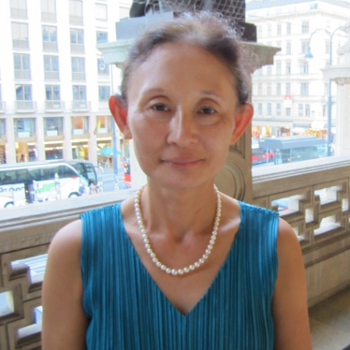In 1934, a 27-year-old Shostakovich presented to an enthusiastic public a “tragi-satirical” opera Lady Macbeth of Mtsensk based on an 1864 story by Nikolai Leskov. The opera, considered by many to be one of the masterpieces of the 20th century, was tragically condemned two years later in the Soviet newspaper Pravda after Stalin attended a performance, and disappeared from the repertoire till the post-Soviet era. The current revival at the Met of its magnificent 1994 production by Graham Vick, which updates the action to a mid-20th century setting with an excellent cast, chorus, and orchestra, truly does justice to the opera and is a triumph for soprano Eva-Maria Westbroek, who sings the title role of Katerina.
The opera began without a prelude to prepare the audience for what was to come. As the curtain rose, there was a raised platform with a background wall painted with blue skies and white clouds, with a row of doors. Katerina, dressed in a bright yellow dress with red rose prints and red pumps, began a plaintive lament of her boredom accompanied by clarinet, while trying to watch television sitting on an overstuffed chair. Her singing was interrupted by her brutish father-in-law, Boris, one of the three male characters of the opera who together represent the oppression suffered by Katerina, a bored housewife of a provincial merchant. In fact, Katerina experiences almost constant jeering, teasing and roughhousing from those who surround her throughout the opera, be it her father’s employees, wedding guests, or fellow prisoners. By giving others the kind of music that is often truncated, jagged and syncopated, Shostakovich succeeded in making Katerina the only sympathetic character in the opera despite her two murders, first of her father-in-law and then of her husband when her affair with a worker Sergei was discovered. All of Katerina’s arias are melodic and lyrical, in contrast to the rest of the music.
Ms Westbroek’s warm and focused soprano ideally suits the role of Katerina. Her middle voice was especially rich and expressive, and she was also able to negotiate skillfully a wide range of music, including some jagged music during the brutal sex scene with Sergei and the murder scenes. She always truly sang the role, never resorting to shouting or screaming. Her Katerina was not a helpless victim of her surroundings; once her sexuality was awakened she took control of her destiny, right up to the end when she killed herself and her rival for Sergei’s affection. One could see the development and change in the character, almost step by step. The last scene when she realized Sergei’s betrayal was truly wrenching. Ms Westbroek stood still upstage, dressed in her short wedding dress under a prisoner’s yellow jacket and a wedding veil, and as the orchestra blasted a series of short chords, her mouth opened in despair, as in Munch’s Scream. Then she sang her last aria about a lake in the forest, almost as in a trance. This was a complete and memorable performance.
Brandon Jovanovich sang Katerina’s lover Sergei with a bright and powerful voice, and acted the part of a callous seducer with confident swagger. His tenor voice rang out clearly over the chorus in the crowd scene, and his tall frame dominated the stage. Another tenor, Raymond Very, excelled in his brief scene as Katerina’s husband Zinovy with his piercing voice. Three Russian bass-baritones provided memorable vocal counterpoints to these high voices, Anatoli Kotscherga as Boris, Vladimir Ognovenko as Police Sergeant and Dmitry Belosselskiy as an Old Convict. Mr Kotscherga was particularly effective as he slinked around the stage singing of old age, disappointment with his son, nostalgia for youth and passion. His frustration and rage were catalyst to Katerina’s subsequent murders, as Boris beat Sergei as the affair was discovered. Katerina reacted by poisoning Boris, whose death scene with the priest and subsequent appearance as a ghost both proved to be some of the opera’s highlights for their satirical effect.
The chorus was used extensively, as Boris’s employees, wedding guests, policemen, and prisoners on the way to Siberia. Their role was crucial and integral to the opera. The Met Chorus sang and acted splendidly, continuing their good work of the season. The orchestra was led by James Conlon, who also conducted the première of the opera at the Met in 1994, played the wide-ranging music with sophisticated power and dynamism. The wind and brass sections were especially notable, as was the solo violin. After all the volume, melody and sometimes dissonance, the opera ended as it began, quietly and sadly with the orchestra sound finally disappearing in the darkness. The opera was called by some an “opera symphony” due to its prominence of the orchestra. I would prefer “symphonic opera” to characterize this musical masterpiece.
The music is continuous in each act, with three scenes in Acts I and III and two scenes in Act II connected seamlessly by five orchestral interludes. These interludes are truly symphonic as they connect the preceding and following scenes, either repeating or introducing musical themes. The orchestral music often comments on the true nature and motivation of the characters and the scenes. Interspersed throughout are elements of Russian folk music as well as references to other composers’ music, and they are often satirically used as the tragedy seems never taken too seriously.
Graham Vick’s production is just as inventive, clever and shocking as it must have been in 1994. The musical interludes were creatively illustrated, as when a group of brides appeared with vacuum cleaners to show Katerina’s plight in Act I, and scene changes were seamless. The police station scene was especially hilarious, with comics representing the police oppression with a large illustration of an arm overhead, as well as the policemen wearing comic T-shirts under their uniform and reading comics to file away their time. The production’s overall wit and sarcasm are perfect complement to the masterpiece that is here flawlessly realized.




